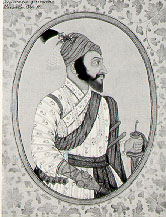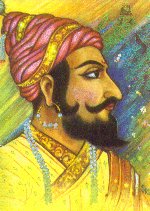 Shivaji was the only son of Shahaji Bhosle's influential wife Jijabai.
Early in his childhood, Shahaji sent him to Pune along with his mother under the care of Dadoji Konddev, an able minister. Shahaji was a brilliant general who switched from Adil Shah of
Bijapur to Nijam Shah of Ahmednagar to the Moghuls many times during his career. He used to have an army of his own and at one point had declared himself to be a king. During Shivaji's
childhood, Dadoji (d. 1650), alongwith men handpicked by Shahaji, managed a few forts and a piece of land in the hilly Deccan which were given to him by Shahaji. At that time, India was
under control of the four Muslim powers Adil Shahi, Nijam Shahi, Golkonda Empire and the Moghuls who were ever eager to fight among themselves. The state of the common man, in particular
the Hindus as a community, was pathetic and humiliating.
Shivaji was the only son of Shahaji Bhosle's influential wife Jijabai.
Early in his childhood, Shahaji sent him to Pune along with his mother under the care of Dadoji Konddev, an able minister. Shahaji was a brilliant general who switched from Adil Shah of
Bijapur to Nijam Shah of Ahmednagar to the Moghuls many times during his career. He used to have an army of his own and at one point had declared himself to be a king. During Shivaji's
childhood, Dadoji (d. 1650), alongwith men handpicked by Shahaji, managed a few forts and a piece of land in the hilly Deccan which were given to him by Shahaji. At that time, India was
under control of the four Muslim powers Adil Shahi, Nijam Shahi, Golkonda Empire and the Moghuls who were ever eager to fight among themselves. The state of the common man, in particular
the Hindus as a community, was pathetic and humiliating.On this background, 18 year old Shivaji and his faithfuls took the oath at Rohedeshwar Temple to establish a 'Nation of the Natives' which Shivaji maintained was the 'Will of the Providence'. In his next 35 years he lived an epic which thrilled the imagination of his friends and foes alike. It is impossible to present an adequate depiction of his eventful career in a short essay. Col. R.D. Palsokar has written a noteworthy book Shivaji : The Great Guerrilla on Shivaji's military campaigns with the Defence Service officers as his intended audience. In that book, the author has made a fairly detailed case study of the killing of Afzal Khan, the escape from Panhala, the night attack on Shayiste Khan, the raids on Surat and his crowning glory - Karnatak Conquest, in which he won land almost equal to his existing empire in a matter of days. The interested reader should go through it.
On June 6, 1674 Shivaji was coronated a soverein king. India was under the juggernaut of foreigners for at least 3 centuries. The belief that only a Muslim ruler from Delhi/Bijapur/Ahmednagar/Golkonda was given the right to rule was widespread and the common man had come to accept and live with it. Shivaji's coronation and its background gave Hindus all over India the assurance that they too were entiled to a free and fair life, and the confidence that if they were willing to fight it out, it could be theirs. His administration seems to have been centralised and quite efficient with a cabinet of 8 ministers looking after well defined departments.
Considering the sagacity, originality and ability to execute hazardous operations putting his own life at stake, it is not too much to say that Shivaji belongs to the highest bracket of the generals the world has seen and stakes a very strong claim to the title of the Greatest World Hero. Even then, his greatest achievement is that he succeeded in building an empire which was looked upon by his people as their Nation for generations to come.







 Return to Main
Return to Main